人教版七年级英语上册 Unit 6 SectionA (Grammar Focus-3c)
【精选】人教版七年级上册英语Unit6第六单元优秀教案
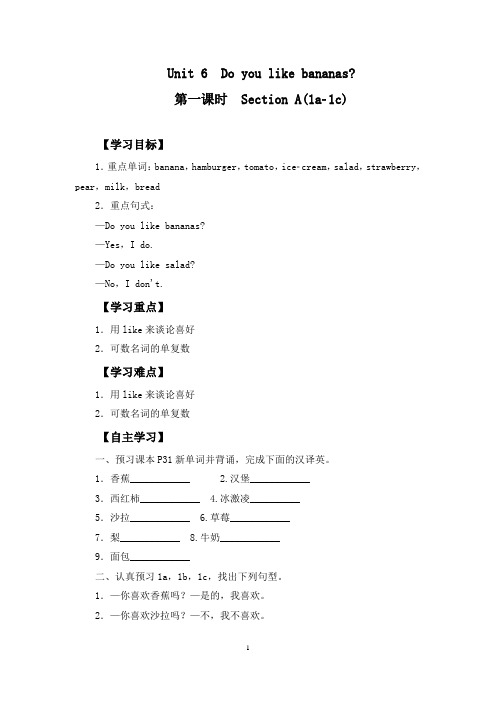
Unit 6 Do you like bananas?第一课时Section A(1a1c)【学习目标】1.重点单词:banana,hamburger,tomato,icecream,salad,strawberry,pear,milk,bread2.重点句式:—Do you like bananas?—Yes,I do.—Do you like salad?—No,I don't.【学习重点】1.用like来谈论喜好2.可数名词的单复数【学习难点】1.用like来谈论喜好2.可数名词的单复数【自主学习】一、预习课本P31新单词并背诵,完成下面的汉译英。
1.香蕉____________ 2.汉堡____________3.西红柿____________ 4.冰激凌__________5.沙拉____________ 6.草莓____________7.梨____________ 8.牛奶____________9.面包____________二、认真预习1a,1b,1c,找出下列句型。
1.—你喜欢香蕉吗?—是的,我喜欢。
2.—你喜欢沙拉吗?—不,我不喜欢。
【课堂导学】Step 1情景导入Teacher:There are many different kinds of fruits and vegetables in the world,and different people like different food.Everyone has its own taste.What kind of food do you like?What kind of food do you dislike?Today let's talk about the food we like and we dislike in Unit 6.环节说明:由学生感兴趣的话题导入新课,简洁明了,激起学生的学习兴趣。
Unit 6 Section A (grammar focus-3c)课件-人教版英语七年级上册

—__N_o____, __s_h_e___ _d_o_e_s_n_’_t.
8. Paul likes milk. He doesn’t like bread. (合为一句)
Paul likes milk, __b_u_t___ he doesn’t like bread.
可数名词
n.鸡蛋 an egg 一个鸡蛋
oranges. but前面是肯定描述,but后面是否定描述 4. We (likes / like) hamburgers, but we don’t (like / likes)
chicken.
5. They (likes / like) pears, but they (don’t / doesn’t) like
类别
单数
复数
deer(鹿)
deer
单复数同形 Chinese(中国人) Chinese
sheep(绵羊)
sheep
语法探究 可数名词复数形式不规则变化
类别
单数
复数
词尾发生变化 child(小孩) children
woman(妇女) women
单复数 改变单词的元 man(男人) men
不同形 音字母
B: OK.
3c Ask your classmates about the food in the chart. Find out what they like and don’t like. 调查你的同学,看看表中的食物他们喜 欢什么,不喜欢什么。
Food
Likes
Doesn’t like
ice-cream
例词 book-books 以ob结o尾x-的bo名xe词s 变 复 英数雄str(加hawe-rebos的)e爱r有r吃y:-西 红柿str(atowmbaetror)i和es土 豆k(pnoitfaet-ok)nives
人教新目标版英语七年级上册Unit6Doyoulikebananas?SectionA同步练习卷-

人教新目标版英语七年级上册Unit 6 Do you like bananas?Section A(Grammar Focus -3c)同步练习卷学校:___________姓名:___________班级:___________考号:___________一、根据汉语提示填空1.—Do you like ________(鸡蛋)?—No, I don’t. I like fruit.2.I don’t like ________(米饭). What about you?3.My little brother likes ________(鸡肉)very much.4.My rabbit(兔子)likes ________(胡萝卜)a lot.5.She likes ________(面包). She thinks it’s good for her.二、完成句子6.——他们喜欢梨吗?——是的,他们喜欢。
—________ they like ________?—Yes, ________ ________.7.——她喜欢西红柿吗?——不,她不喜欢。
—________ she like ________?—No, ________ ________.8.我们不喜欢汉堡包。
We ________ like ________.9.他不喜欢蔬菜。
He ________ like ________.10.那么,我们取些沙拉吧。
________, let’s ________ some ________.三、单项选择11.—________ your brother like salad?—Yes, he ________.A.Is; is B.Do; do C.Are; are D.Does; does 12.—Do you like hamburgers?—No, ________.A.I don’t like them B.I don’t like it C.that’s good D.let’s eat四、改写句子13.They like ice-cream.(变成否定句)They ________ ________ ice-cream.14.He has three ping-pong balls.(变成否定句)He ________ ________ three ping-pong balls.五、单项选择15.—What would you like to eat?—I’d like some ________ and ________.A.bread; milks B.breads; milks C.breads; milk D.bread; milk六、用所给单词的正确形式填空16.The new plan asks residents (居民) to put their rubbish into four different__________ ,one for each kind of rubbish. ( box )七、单项选择17.Hurry up!Some _____ and ____ are on sale in the supermarket.A.tomato; egg B.tomatoes; eggC.tomatoes; eggs D.tomato; eggs18.—What sport do you ________?—I like playing tennis and running(跑步).A.like B.make C.help D.see 19.—Do you like ________ TV?—No, I don’t.A.watch B.watching C.watches D.watched 20.I have to study too much __________ I don’t get enough sleep.A.but B.so C.or21.I really want to have a pet dog,_____ my mother disagrees.A.but B.and C.or D.so22.-Which sport do you prefer,volleyball ___________ basketball?--I prefer volleyball.A.or B.and C.but八、其他图解助记:chicken23.我奶奶在院子里养了一些小鸡。
2021-2022学年人教版七年级英语上册Unit 6 1-5课时教案

S1:It's ________.T:What are those?S1:They are ________.T:Just now we saw many pictures of food.Do you like fruit?Yes,they are very beautiful and delicious!Today,we will learn something about food.And we will have a competition between boys and girls during the class.The winner will be our Fruit King!Do you want to be the Fruit King?Step 3完成教材1a-1c的任务1.认真观察1a中的图片,将所给单词与图中的物品配对并熟记这些单词。
2.将1a中的单词按可数与不可数进行分类。
3.认真听录音,按听到的顺序给1b中的对话编号,然后快速背诵1b 中的三个小对话。
4.模仿1b中的对话,并用1a中其他的单词编写对话,在小组内结对练习对话,完成1c的任务。
A:Do you like oranges?B:Yes,I do./No,I don't.5.小结训练。
(B)(1)—Do you like apples?—Yes,I ________.A.like it very much B.like them a lotC.like a lot it D.don't like them(A)(2)Do you like ________?A.bread B.breadsC.a bread D.hamburger(C)(3)—Do you like oranges?—________.I want to eat them now.A.Yes,I don't B.No,I doC.Yes,I do D.No,I don't知识点拨▲like动词,意为“喜欢;喜爱”。
人教版七年级英语上册教案Unit 6第3课时Section A (Grammar Focus-3c)
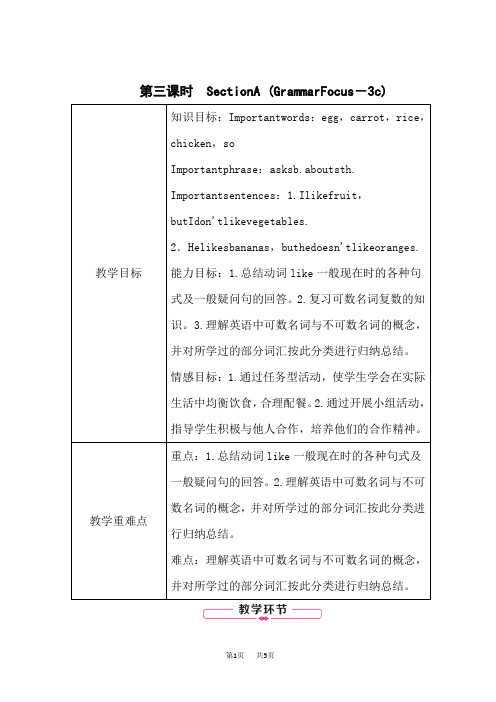
第三课时SectionA (GrammarFocus-3c)Step1 情景导入【参考案例】T:Doyouliketomatoes/oranges/salad…?S1:Yes,Ido./No,Idon't,butIlike…T:Doesshe/heliketomatoes/oranges/salad…?S2:Yes,she/hedoes./No,she/hedoesn't,butshe/helikes…设计意图:通过师生互动问答复习上节课内容,在问答中提醒学生注意一般现在时态第三人称单数的使用。
Step2 畅通GrammarFocus回顾语法重点【操作案例】1.学生阅读GrammarFocus中的句子,总结含有实义动词的一般现在时的句型规律。
2.阅读方框中可数名词和不可数名词,并对所学过的部分词汇按此分类进行归纳总结。
设计意图:学生通过阅读感知句型规律,并做出总结。
通过阅读方框中可数名词和不可数名词,进一步加深理解。
Step3 完成教材3a-3c的任务【操作案例】1.认真阅读3a的5个句子,并在括号内正确的单词下面画线,使句子正确完整。
2.学生说出答案,老师核对,然后让学生大声朗读这些句子,并背诵。
3.认真阅读3b的几个句子,将其编号,组成对话,然后读背。
4.做食物调查。
用“Doyoulike…?”句型就3c表格中的食物向小组成员提问。
找出他们喜欢和不喜欢的食物,并把结果登记在表格中。
设计意图:学生通过参加活动和练习,更好地掌握本课知识。
知识▲可数名词与不可数名词的含义与特点Step4 随堂练习 根据图示,完成句子。
1.Paullikestomatoesand__icecream __.2.Pauldoesn'tlikehamburgersor__strawberries__. 3.Emmalikes__hamburgers__andstrawberries. 4.Emma__doesn't__like__tomatoes__or__icecream. 5.Paullikestomatoes ,butEmma__doesn't__like__them. Step5 板书设计SectionA (GrammarFocus -3c)Importantwords :egg ,carrot ,rice ,chicken ,so Importantphrase :asksb.aboutsth. Importantsentences :1.Ilikefruit ,butIdon'tlikevegetables. 2.Helikesbananas ,buthedoesn'tlikeoranges.Step6 完成学生用书。
Unit 6 Section A Grammar Focus-3c 课件 人教版英语七年级上册

Grammar Focus
Do you like salad?
Do they like pears? Does she like tomatoes? I like oranges. We like rice. He likes ice-cream.
Yes, I do./No, I don't.
Yes, they do./No, they don't. Yes, she does./No, she doesn't. I don't like bananas. We don't like hamburgers. He doesn't like vegetables.
Complete the chart!
Food
Likes Doesn’t like
Ⅰ. 用所给单词的适当形式填空。
1. I like __t_o_m__a_to_e_s___(tomato) very much. 2. Nick ____l_ik_e_s_____(like) hamburgers and salad. 3. Let’s ___t_h_i_n_k_____(think) about the birthday dinner. 4. Ms. Smith has ten _s_t_r_a_w_b_e_r_r_ie_s_(strawberry)? 5. Hamburgers? That ___s_o_u_n_d_s____(sound) good. 6. My brother __d_o_e_s_n_’t_l_i_k_e_(not like) eggs. 7. His cousins ___d_o_n_’t__li_k_e__(not like) ice-cream.
人教版七年级上册英语教案Unit 6 Section A Grammar Focus-3c带教学反思

Step 7
中考链接
(PPT 40)
Practice the usage of uncountable nounbread
可数名词的复数和不可数名词的用法是中考必考的语法内容,因此选择该中考题使学生建立所学内容与中考的链接。
Step 8
Step 2
Presentation
(PPT 11)
1. Show the grammar focus andwork on Grammar Focus.
2. Ask students to read the sentences in this part and pay attention to the comfortable nouns and uncomfortable nouns.
My mother likes …, but she doesn’t like …
设计该作业主要以语篇的形式练习所学的语法。特别提醒要注意可数名词复数和不可数名词的用法,以达到对本单元所学语法的综合运用的教学目的。
板书设计
Unit 6 Do you like bananas?
Section A(Grammar Focus-3c)
教学过程(表格描述)
教学环节
主要教学活动
设置意图
Step 1
Lead-in
(PPT 4-10)
Read the chant and review the grammar.
Do you like pears?
Yes, I do. Yes, I do. I like pears.
Do I like bananas?
3.learn to tell the healthy food and unhealthy food, so that you can eat healthily.
人教版新目标英语七年级上册 Unit 6 教案(共计17页)
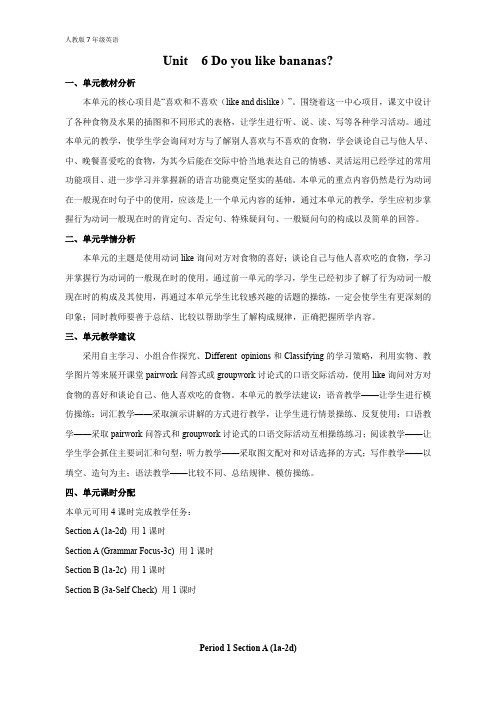
Unit 6 Do you like bananas?一、单元教材分析本单元的核心项目是“喜欢和不喜欢(like and dislike)”。
围绕着这一中心项目,课文中设计了各种食物及水果的插图和不同形式的表格,让学生进行听、说、读、写等各种学习活动。
通过本单元的教学,使学生学会询问对方与了解别人喜欢与不喜欢的食物,学会谈论自己与他人早、中、晚餐喜爱吃的食物,为其今后能在交际中恰当地表达自己的情感、灵活运用已经学过的常用功能项目、进一步学习并掌握新的语言功能奠定坚实的基础。
本单元的重点内容仍然是行为动词在一般现在时句子中的使用,应该是上一个单元内容的延伸,通过本单元的教学,学生应初步掌握行为动词一般现在时的肯定句、否定句、特殊疑问句、一般疑问句的构成以及简单的回答。
二、单元学情分析本单元的主题是使用动词like询问对方对食物的喜好;谈论自己与他人喜欢吃的食物,学习并掌握行为动词的一般现在时的使用。
通过前一单元的学习,学生已经初步了解了行为动词一般现在时的构成及其使用,再通过本单元学生比较感兴趣的话题的操练,一定会使学生有更深刻的印象;同时教师要善于总结、比较以帮助学生了解构成规律,正确把握所学内容。
三、单元教学建议采用自主学习、小组合作探究、Different opinions和Classifying的学习策略,利用实物、教学图片等来展开课堂pairwork问答式或groupwork讨论式的口语交际活动,使用like询问对方对食物的喜好和谈论自己、他人喜欢吃的食物。
本单元的教学法建议:语音教学——让学生进行模仿操练;词汇教学——采取演示讲解的方式进行教学,让学生进行情景操练、反复使用;口语教学——采取pairwork问答式和groupwork讨论式的口语交际活动互相操练练习;阅读教学——让学生学会抓住主要词汇和句型;听力教学——采取图文配对和对话选择的方式;写作教学——以填空、造句为主;语法教学——比较不同、总结规律、模仿操练。
2019-2020年七年级英语上册Unit6Doyoulikebananas(第2课时)SectionA(GrammarFocus-3c)学案(新人教版)

2019-2020年七年级英语上册Unit6Doyoulikebananas(第2课时)SectionA(GrammarFocus-3c)学案(新人教版)【学习目标】1.能正确拼写、拼读egg,carrot等单词。
2.能够进一步利用所学的目标语言进行口头交流。
3.培养跨文化交际的意识。
【学习重点】区分可数名词与不可数名词。
【学习难点】do/does引导的一般疑问句及含有don't/doesn't的否定句。
☞学习提示Show some pictures of food, ask and answer students one by one.Task 1☞学习提示Preview the words, phrases and sentences on P33. Students mark the new words and Chinese meanings in the text.【学法指导】1.可数名词不单用:He likes apples(apple).2.可数名词一般在前面常用冠词a/an/the,或者用复数表示某一类事物。
Task 2☞学习提示1.Read and finish 3a,3b.2.要求学生总结一般现在时态的句子中动词第三人称的变化。
【学法指导】►在一般现在时态的句子中动词第三人称单数形式的变化当句子的主语为第一人称、第二人称和第三人称复数形式时,谓语动词用原形,变否定句和疑问句,要添加助动词do来完成。
当句子主语为第三人称单数形式时,在肯定句中谓语动词也应用其第三人称单数形式,即在动词后面加“s 或es”构成第三人称单数形式。
在否定句和疑问句中,要添加助动词does来完成,且谓语动词变成原形。
情景导入生成问题T:What's this?S:It's a /an…T:Do you like…?S:Yes, I do./No, I don't. T:What are these?S:They are…T:Do you like them?S:Yes, I do./No, I don't.自学互研生成能力Task 1Let's read new words and phrases.1.I can read.(我会读)预习下列单词,争取自己能正确拼读。
新人教版(2024)Unit 6 Section A Grammar Focus 练习题 七年级上册

Unit6 Section A Grammar FocusI.单项选择1. Lucy has a music show_____Friday evening.A.inB.onC. atD. past2.-______do you usually play soccer?一At 7:30 p.m. after dinner.A. WhyB. WhatC. WhenD. How3. Tony's sister often goes swimming with her friends______summer.A.inB. onC. atD. to4.一David,______do you go to school?-I go to school at 8:00 a.m.A. how longB. what timeC. what aboutD. how much5. Daisy starts learning to play the piano______ the age of twelve.A. inB. onC. atD. to6. My birthday is______October 5th, and I want to have a party.A. inB. onC.atD. to7.-______Mr Wang have his class?-On Mondays,Wednesdays and Thursdays.A. WhatB. WhenC.What doesD. When doesII.句型转换(每空一词)8. Jack usually gets up at 7:00 a.m.(对画线部分提问)______ ______ ______Jack usually______up?9. Lucy has a dance class on Sunday morning.(改为一般疑问句并作肯定回答)-______Lucy ______a dance class on Sunday morning?-________,________ _______.10. My grandfather plays chess with his old friends after dinner.(对画线部分提问)______ _______your grandfather______chess with his old friends?情境每个人的生活作息都各不相同,让我们一起走近 Leo 的周五生活。
新目标七年级上册英语Unit 6 Section A (Grammar Focus-3c)练习题及答案一

新目标七年级上册英语Unit 6 Section A (Grammar Focus-3c)练习题及答案一Part1根据句意及汉语提示完成单词1.Do you like (水果)?2.Let’s go to Tom’s (生日) party.3.He likes (苹果),but he doesn’t like pears.4.I have (米饭) and tomatoes for dinner.5.I think you’re (正确的).6、“Do you like c________ or fish(鱼肉)?”“I like fish.”7.I am late for class(上课迟到).S________my teacher is angry(生气的).8.My son likes fruit but he doesn't like v____________.9.In the morning I have some pieces(片)of b________for breakfast. 10.We'd better(最好) drink a glass of m________ every day. It's good for our health(健康).11.What ________ (食物)does your son like?12.Some ________ (鸡蛋)are under the sofa.13.We can see three ________ (胡萝卜)on the table.14.Tina doesn't like ________(米饭).What about you?15.—Here is some ________(鸡肉) for you.—Thank you.Part2用所给单词的适当形式填空。
1.Tom and Jack ________(like) apples.How about you?2.Some ________(bread) is on the table.3.They ________(not like) hamburgers.They like chicken.4.—________ Mike ________(like) oranges?—Yes,he does.5.—Let's play basketball after school.—________(sound) good.6.They ______________(not like) pears,but they________(like) apples. 7.Do you like ________ (vegetable) salad?8.Zhao Jun________(like)chicken and fish,but he____________(not like) vegetables.9.________ he________(like) salad?10.They like ____ (hamburger),but they don't like_ (strawberry).Part3根据句意,选择正确的单词填空1.My sister (like/likes) hamburgers.2.Jim (don’t/doesn’t) have dinner.3.Here (is/are) some milk.4.Where is the (oranges/milk)?5.(Do/Does) your mother (like/likes)sports?Part4按要求改写下列句子1.Does Nick like bananas?(作否定回答),.2.He likes vegetables and fruit.(改为否定句)He vegetables or fruit.3.Johnson likes salad.(改为一般疑问句)Johnson salad?4.She doesn’t have any bananas.(改为肯定句)She bananas.5.Tommy and Sally like ice-cream.(对画线部分提问)Tommy and Sally ?6.I like milk.(改为一般疑问句)________ you________milk?7.Bill likes strawberries.(改为否定句)Bill ________ ________strawberries.8.I don't like oranges.(用Tom代替I )Tom ________ ________ oranges.9.How about some oranges?(改为同义句)________ ________ some oranges?10.I like pears__and__vegetables.(对画线部分提问)________ ________you ________?11.She likes ice-cream very much. (改为否定句)_______________________________________________________12.I like oranges.(用he替换I)_______________________________________________________ 13.Do you like sports?(作否定回答)_______________________________________________________ 14.like, Emma, at, eating, not, all, salad, does(.) (连词成句) _______________________________________________________ 15.Does Sally like chicken?(作否定回答)_______________________________________________________ 16.Do you like bananas?(作肯定回答)________,I________.17.She likes ice-cream.(改为一般疑问句)________ she________ ice-cream?18.My father likes pears.(改为否定句)My father ________ ________ pears.19.I don't like oranges very much.(用Mary替代主语改写句子) Mary ________ ________ oranges very much.20.It is a strawberry.(变为复数句)__________ __________ ____________.参考答案Part11.fruit2.birthday3.apples4.rice5.right6.chicken7.So 8.vegetables 9.bread k11.food12.eggs13.carrots14.rice15.chickenPart21.like2.bread3.don't like4.Does;like5.Sounds6.don't like;like7.vegetable 8.likes;doesn't like9.Does;like 10.hamburgers;strawberriesPart31.likes2.doesn’t3.isk5.Does;likePart41.No;he doesn’t2.doesn’t like3.Does;like4.has some5.What do;like6.Do; like7.doesn't like8.doesn't like 9.What about 10.What do; like11.She doesn't like ice-cream at all. 12.He likes oranges. 13.No,I don't.14.Emma does not like eating salad at all. 15.No,she doesn't. 16.Yes;do 17.Does;like 18.doesn't like 19.doesn't like 20.They are strawberries。
人教版七年级上册英语Unit 6 课时2 Section A (Grammar Focus-3c)
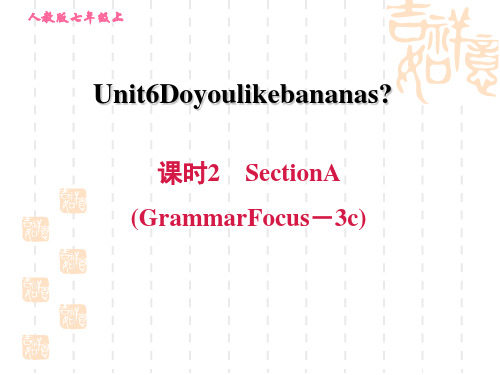
五、任务型阅读。
eggs, apples, 23. _________, carrotsor24____________.
26. L___ik__e__s_____orFrenchfriesDoesn’t like
hamburgers, eggs, apples, 2b3an.anas
French fcrhiieckse,n22. _________, bcraorcrcoltis or
四、按要求完成句子。 16. Ilikeapples.(改为否定句) I________________apples.
don’tlike
17. Marylikesice-cream.(改为否定句) Mary________________ice-cream.
doesn’tlike
18. Theylikepears.(改为一般疑问句) ________they________pears?
salad
Ialwayshaveapples, bananasand_____s_tr_a_w__b_e_r_ri3e2s (strawberry) init, butdon’tlike________33 (pear) init.
pears Mybrotherisdifferent(不同的)fromme. He________34 (like) ice-creamand____________35 (halimkbesurger), buthe__________36 (hnoatmlibkeu)rcgheicrks en. Whatabout__________37 (vegetable)? Well,
5 so
10 能力提升练
答案呈现
人教英语七年级上册Unit6SectionA1a2d

Pre-listening
1a Match the words with the things in the picture.
1. hamburgers _d__
ad e g
2. tomatoes __i_ 3. oranges __f _ i 4. ice-cream _h__
h
5. saladБайду номын сангаас__b_
Post-listening
1c Practice the conversations with your partner. Then make your own conversations.
2 A: Do you like salad? B: No, I don’t.
1 A: Do you like bananas? B: Yes, I do.
—Do you like bananas? —Yes, I do. —Do you like salad? —No, I don’t. —Do you like oranges? —Yes, I do.
While-listening
1b Listen and number the conversations [1-3].
以元音字母+y结尾的可数名词变复数,直接在词尾加-s。
library - libraries(复数) dictionary - dictionaries(复数)
boy - boys(复数)
toy - toys(复数)
Pre-listening
Language points
3. ice-cream (教材P31 1a)
如果喜欢就打√,不喜欢就打×。
Name hamburger tomatoe oranges ice-
Unit 6 Section A(Grammar Focus)课件人教版2024新教材七年级上册英语

3c Complete the passage with the correct forms of the verbs in
brackets.
correct form 正确形式
gets does
makes
meets
play
goes
helps
watches
plays
goes
restaurant n. 饭店
妈妈到家时我在读书。 4.what time用来对某个时间提问,希望知道的时间比
when更具体。 eg:—What time do you get up in the morning? 你早上几点起床? —About six.大约6点。 What time does the shop open?这个商店几点开门?
8. 这是我的学校日程安排。T_h_i_s_i_s _m_y__sc_h_o_o_l_d_a_y_r_o_u_ti_n_e_.
9. 你什么时候吃早餐?__W__h_e_n__d_o_y_o_u__h_a_v_e_b_reakfast?
10. 早睡早起。 _E_a_r_ly__to__b_e_d_,_e_ra_l_y_t_o_b_e_d_._
When/ What time区别: 表什么时候,具体时间(钟点) 两者都可用。
年份,月份,日期等非钟点性时间只能用 when不能用 what time
When具体时间、 年、月、日非钟 点性时间
What time 具体时间钟点
What的使用方式
➢ what 对动词进行提问 ➢ The woman is cooking in the kitchen. 这个女人正在厨房里做饭。 ➢ 对划线部分句子提问: ➢ What is the woman doing in the kitchen? (此处是对动词提问,注意做变换时时态是
Unit+6+Section+A+Grammar+Focus-3c+教案 人教版英语七年级上册

Unit 6 第三课时教案教学基本信息学科English学段初中年级七年级单元Unit 6课题Do you like bananas?总课时数6课时Section A(Grammar Focus-3c)课型语法课授课时间教学目标及教学重点、难点教学目标:1.知识目标:①学生能掌握本节课的主要词汇和句型:egg,chicken,so,rice,carrot--I like oranges.--I don't like bananas.He likes ice-cream.--He doesn't like vegetables.--Let's get salad.--I like fruit,but I don't like vegetables.②学生能够理解like在一般现在时中的用法,总结动词like在一般现在时中的相关句型变化。
③能够理解可数、不可数、以及既可数又不可数名词在真实情境中的用法。
2.能力目标:①学生能够运用本节课学习的词汇和句型进行交际,会用like描述各人的喜好。
②学生能够对语法规律进行总结,提高理解能力和归纳总结能力。
3.文化意识:①学生通过本节课的学习能够了解西方生活方式与饮食文化,体验不同的饮食文化带来的魅力,养成健康的饮食习惯,同时培养学生的跨文化交际的能意识。
4.思维品质:①学生能通过小组合作,能够拉近人与人的距离,加强与人沟通交往的能力。
②学生能够分析对比中外饮食习惯的差异,能够辩证的看待食品健康问题和饮食习惯问题。
教学重点:1.本节课的主要词汇,引导学生总结动词like一般现在时的肯定句式、否定句式及一般疑问句的肯定、否定回答。
2.理解英语可数名词与不可数名词的概念和知识,并对所学过的部分词汇按此分类进行归纳总结。
教学难点:1.do/does的提问方法及其否定形式,第三人称单数的用法。
2.动词第三人称单数的用法。
教学过程(表格描述)教学环节主要教学活动设置意图Step 1 Lead-in 1.Review the new words about food,fruit andvegetables.2.Ask and answer.Ask and answer about the questions for foods as thefollowing in groups.S1:Do you like …?S2:Yes,I do.S3:Does he like …?S4:Yes,he does.S1:Do you like …?S2:No,I don’t.S3:Does he like …?S4:No,he doesn't.通过复习上一节课的单词和自由问答活动进行复习和操练目标语言,为下面的教学活动作准备。
Unit+6+A+Day+in+the+Life2025学年人教版英语七年级上册

What+be+主语(+其他)? What+助动词+主语+动词原形(+其他)? What’s your family name? 你姓什么? What do you want to eat? 你想吃什么?
主语
常用答语
(1) I’m/We’re ...
—When is his birthday? 他的生日在什么时候? —In May. 在五月。
what, what time与when 的用法
一、用what, what time或when 填空 1. —___W__h_a_t__ day is it today? —It’s Monday. 2. —___W__h_en___ is your birthday? —It’s on May 25th. 3. —___W__h_a_t__ is your favorite sport? —Swimming. 4. —_W__h_a_t _ti_m_e_ do you usually go to bed? —At about 9 o’clock. 5. —___W__h_a_t__ is this in English? —It’s a CD.
D. When
Homework
1. 用本节所学“what、what time和when引导的特殊疑问 句”询问同伴的上学日安排和周末安排,对话不少于3个 来回。 2. 使用动词的正确形式,就同伴的上) 1. — ______ is it? —It’s 6:15.
A. When
B. What
C. What about
D. What time
新人教版七年级上册英语Unit6课时3 Section A Grammar Focus(3a-3d)
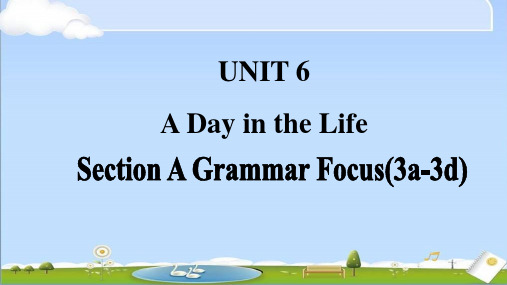
3c Complete the passage with the correct forms of the verbs in brackets.
On Saturdays, Sam sometimes_g_e_t_s__(get) up at 9:00. He _m_a_k_e_s_(make)
his breakfast for his family and then __d_o_e_s__(do) his homework.
2. What time do they have lunch? (at 12:10 in the afternoon) They have lunch at 12:10 in the afternoon.
3. When is your maths class? (at 1:45 p.m.) My maths class is at 1:45 p.m.
go to bed?
_W__h_e_n____________ do they go to the
music club?
They go on Monday afternoons.
_W__h_a_t________ do you do after dinner? Sometimes I read books or do my
4. When does Lisa do her homework? (after dinner)
She does her homework after dinner. 5. When does David play basketball? (on Thursdays)
He plays basketball on Thursdays.
Around 2:00 in the afternoon, he _m__ee_t_s__(meet) his friends, and they
- 1、下载文档前请自行甄别文档内容的完整性,平台不提供额外的编辑、内容补充、找答案等附加服务。
- 2、"仅部分预览"的文档,不可在线预览部分如存在完整性等问题,可反馈申请退款(可完整预览的文档不适用该条件!)。
- 3、如文档侵犯您的权益,请联系客服反馈,我们会尽快为您处理(人工客服工作时间:9:00-18:30)。
Do you like salad? Do they like pears? Does she like tomatoes? I like oranges. We like rice. He likes icecream.
Yes, I do./No, I don't. Yes, they do./No, they don't. Yes, she does./No, she doesn't. I don't like bananas. We don't like hamburgers. He doesn't like vegetables.
Countable nouns
hamburgers, eggs, oranges, bananas, apples, pears, carrots, vegetables, tomatoes, strawberries
Uncountable nouns
milk, bread, rice
Countable and uncountable nouns
food, fruit, Ice-cream, salad, chicken
语法讲解
讲解来自《点拨》
(一)可数名词与不可数名词
名词可分为可数名词和不可数名词,它们的定义、特点和 用法的区别见下表:
分类
可数名词
不可数名词
定义 表示可以计数的事物 表示不可以计数的事物
的名词。
的名词。
特点 有单、复数形式之分。 没有复数形式,但有量 的变化。
eg: some chicken/students 一些鸡肉/学生 many apples 许多苹果 much orange 许多橙汁 a lot of money/bananas 许多钱/香蕉
讲解来自《点拨》
典例 —Would you like some ____D____?
典例 —May I take your order, sir? —____B____【恩施】 A.Chicken with vegetables and two bowls of rices. B.Chicken with vegetables and two bowls of rice. C.Chickens with vegetable and two bowl of rice.
讲解来自《点拨》
典例 —How many ____C____ are there in the basket, Andy? —Five.【梧州】 A. rice B. pear C. bananas D. bread
【点拨】how many意为“多少”,后跟可数名词复数,四 个选项中只有bananas符合要求。
讲解来自《点拨》
可以直接用不定 不能使用不定冠词或数词 用法 冠词a/an或具体的 直接修饰,如要表示确切
数词如one,two, 数量时,要用“数量词+ three等来修饰。 of+不可数名词”结构。
讲解来自《点拨》
考点 1 可数名词复数 可数名词单数变复数方法如下: (1)一般在词尾加s。 eg:pen—pens,computer—computers (2)以字母s, x, sh, ch结尾的名词,加es。 eg:box—boxes,bus—buses watch—watches,
讲解来自《点拨》
考点 2 不可数名词 不可数名词计量时要用“数词或冠词+量词+of +不可数名词”来表示,量词可用单数,也可用 复数。 eg:a glass/two glasses of milk一/两杯牛 奶 a piece/three pieces of bread一/三片面包
讲解来自《点拨》
讲解来自《点拨》
注意以下特殊情况: (1)单复数同形 eg:Chinese—Chinese,Japanese—Japanese,
sheep—sheep,deer—deer (2)不规则变化 eg:foot—feet,man—men woman—women,child—children,mouse—mice (3)有些名词常用复数形式 eg:clothes,trousers,pants,shoes (4)有些名词常用单数形式表示复数概念 eg:people, police
fish表示“鱼”时,是可数名词,单复数同形;表 示“不同种类的鱼”时,是可数名词,复数形式为 fishes;表示“鱼肉”时,是不可数名词,无复数形式。
讲解来自《点拨》
考点 4 修饰可数名词及不可数名词的词汇
修饰可数名词的词 修饰不可数名词的词 既可修饰可数名词,也可 修饰不可数名词的词
many,a few,few much,a little,little a lot of/lots of,some
Section A 课学习的单词、短语和句型,你们都掌握 了吗?现在大家来检验一下,点击下面的音频开始听写吧!
T:“Do you like vegetables...?” S1: “Yes, I do.” S2:“No, I don't."
Grammar Focus
讲解来自《点拨》
考点 3 有些名词既可作可数名词,也可作不可数名词, 但它们表达的意义是不同的,见下表:
可数名词 chicken(鸡)
fish(鱼) glass(杯子)
不可数名词 chicken(鸡肉
fish(鱼肉) glass(玻璃)
讲解来自《点拨》
three fish 3条鱼
three fishes 3种鱼
brush—brushes
讲解来自《点拨》
(3)以字母o结尾的名词,有生命的加es,没有生命的 加s。
eg:tomato→tomatoes,potato→potatoes photo→photos,piano→pianos (4)以字母f,fe 结尾的名词,一般变f,fe为v再加es。 eg:knife—knives,leaf—leaves (5)以辅音字母+y结尾的名词,把y变成i 再加es。 eg:family—families,factory—factories
